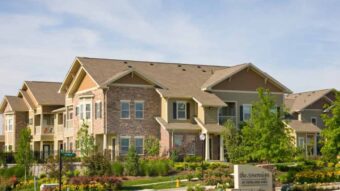As brick-and-mortar retail battles the onslaught of e-commerce, a movement has grown toward experiential sales. If fewer customers are coming out to shop for physical goods, then sell them an experience instead. It’s quite difficult, after all, to ship 20 minutes of indoor skydiving from an overseas supplier.
But even for stores that still earn money off of moving product, the experience is key. Many retailers now offer amenities to entice customers out from behind their screens and into the showroom. And as the trend in auto dealerships indicates, this is a model with virtually no bounds.
“One of the things we’re seeing a lot of is dealerships becoming a place to hang out,” said Aldo Bottalla, vice president of business development at The Missner Group. “They want to keep people at the dealership and make it a comfortable atmosphere.”
The Missner Group has completed a number of new or refurbished auto dealerships recently, and careful attention has been given to the finishes and amenities in an effort to draw customers in and keep them there longer.
The firm was the design/builder for a 14,000-square-foot, large scale renovation for McGrath Acura in Westmont, Illinois, which included glass-enclosed offices off of the showroom, a two-sided fireplace, coffered ceilings, a 30- by 14-foot gable skylight inside the main entrance, a custom fish tank and other high-end finishes throughout.
“Dealerships all have specialty looks that they want,” said Bob Nomellini, COO of construction at The Missner Group. “They spend a lot of money on the insides of their spaces with high-end finishes these days.”
Another dealership, Berman Subaru, tapped Missner on its two-building renovation at 4330 and 4444 Irving Park Road in Chicago. Amenities include a café and Wi-Fi lounge furnished with leather chairs and lit by LED lights as well as a sculptural, wood veneer chandelier.
Other amenities include phone-charging stations, putting greens and children’s play areas complete with video game console. Some dealerships will serve breakfast or lunch out of a full kitchen, or host fundraising events such as poker nights—anything to draw in more people. Impulse buying isn’t just for candy bars at the grocer’s checkout counter; more people in the building perusing the display models equate to more possible car sales.
This approach applies to the service area as well. Dealerships are shrinking the turnaround time for vehicle service, especially on relatively small jobs. While this is obviously good customer service, it’s a tactic that also brings more people into the facility.
If a customer has to wait too long or enter a queue for a small service job, they’ll just drop the car off and retrieve it later. But if the work can be completed in 20 to 30 minutes, they will more likely opt to grab a coffee or do some work on their laptop over the free Wi-Fi. They also might go meandering through the showroom.
“A big part of it for these dealers is service, probably more so than the new car sales,” said Nomellini. “People will come in and sit and wait for their oil changes and other small services.”
The Missner Group recently completed construction of the new, state-of-the-art Chicago Northside Toyota, located at 6042 N. Western Avenue in Chicago. The five-story, 227,900-square-foot dealership is one of the largest of its kind.
The environmentally friendly dealership contains a 45,000-square-foot green roof and 183,000 square feet of interior space, including a 30,000-square-foot showroom. Surrounded by 28-foot glass panels, the showroom is capable of exhibiting over 35 vehicles, with vertical display on the second and third floors.
Construction of the facility included the implementation of unique amenities to ensure customer satisfaction and retention. Guests of the dealership enjoy indoor valet parking and a children’s play area. The contemporary customer waiting lounge offers free Wi-Fi and Starbucks coffee bar, with space for up to 100 guests.
Many of these decisions are out of ownership’s hands, instead dictated—or heavily influenced—by the manufacturers. Some manufacturers require that new facilities adhere to a style guideline so that a guest walking into a Volkswagen dealership will encounter the same atmosphere whether that facility is in Chicago, Houston, Atlanta or elsewhere.
Particularly for the high-end finishes, that can be driven by manufacturer input. When someone buys a car, they are usually given a customer satisfaction survey. The results go back to the manufacturers, who dole out customer service inquiry money to the well-performing dealerships.
“They want to make sure that how these customers perceive their dealerships is nothing less than state of the art,” Bottalla said.
Whether new or refurbished, car dealerships are skewing toward luxury and convenience, desirous to offer an experience as much as a product. If this trend can work where the product costs tens of thousands of dollars, it should be successful throughout the retail industry.



